Flags of Countries that Start with U
How many countries beginning with U? There are a total of 7 countries starting with letter U among the 193 countries in the world:
- Uganda
- Ukraine
- United Arab Emirates
- United Kingdom
- United States
- Uruguay
- Uzbekistan
United Kingdom
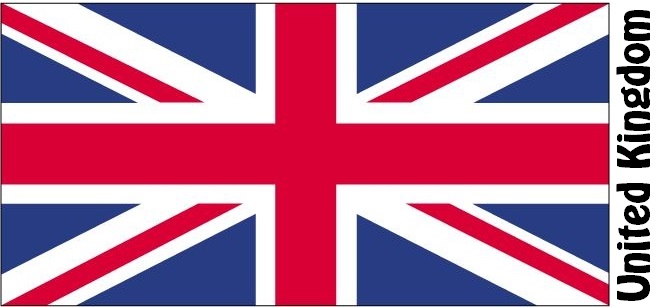
The United Kingdom is a Kingdom of NV Europe. The country includes England, Wales, Scotland and Northern Ireland as well as a number of smaller islands. IV and N, the landscape consists of highlands, lakes, rivers, valleys and a cut-in coastline towards the Atlantic Ocean. IS and Island there are lowland and moraine landscape with rivers, marshland and hills.
Britain has temperate coastal climate.
The most important natural resources are oil, coal and natural gas. The cattle and sheep team is large. Beetroot, cereals, potatoes, rapeseed, fruits and vegetables are grown.
In the 19th century, Britain was a worldwide empire with many colonies. Part of the colonies are now part of the British Commonwealth of Nations. The United Kingdom is a member of NATO and the EU, but is beyond economic and monetary cooperation. In 2016, after a referendum, Britain decided to leave the EU.
Country Facts – State Capital – Population Graph – Airports – Public Holidays – Embassies in United Kingdom – Import Regulations – Major Trade Partners – Major Imports – Major Exports
Ukraine

Ukraine is a republic in Eastern Europe. The country lies on the Black Sea and borders Moldova, Romania, Hungary, Slovakia, Poland, Belarus and Russia. Most of the landscape is plains, grassy steppes and rivers. IV there are uplands and mountains, in SV there are plateau landscapes, and farthest towards S in the Crimean peninsula there are also mountains.
The mainland climate is temperate in most of the country, though subtropical in Crimea.
The most important natural resources are fertile agricultural land (black soil), oil, natural gas, coal, iron ore, minerals and hydropower. Among other things, wheat, corn, potatoes, grapes and vegetables. Some cattle are kept.
Ukraine was part of the Soviet Union from 1923 to 1991. The Crimean Peninsula has been the subject of conflicts between Russia and Ukraine. Russia annexed Crimea in 2014.
Country Facts – State Capital – Population Graph – Airports – Public Holidays – Embassies of Ukraine – Embassies in Ukraine – Import Regulations – Major Trade Partners – Major Imports – Major Exports
United States

The United States is a federal state of North America with 48 consecutive states as well as Alaska V for Canada and Hawaii in the Pacific. Borders of Canada and Mexico. The landscape consists of the Appalachians in the island and the Rocky Mountains in the V as well as the large plains in the middle of the country. The Mississippi and Missouri rivers run from N to S in the central United States. Towards N a number of large lakes.
The US has a particularly temperate climate with large differences in temperature and precipitation from Ø to V. In the SE and V and SV there is subtropical climate. In southern Florida, there is tropical climate.
The most important resources are oil, natural gas, coal and a wide range of ores (iron, copper, zinc, molybdenum, uranium, silver). Agriculture is highly developed. Forestry in NV produces timber and paper.
The United States is the world’s richest and militarily strong nation. The United States is a member of NATO.
Country Facts – State Capital – Population Graph – Public Holidays – Embassies of United States – Embassies in United States – Import Regulations – Major Trade Partners – Major Imports – Major Exports
Uruguay
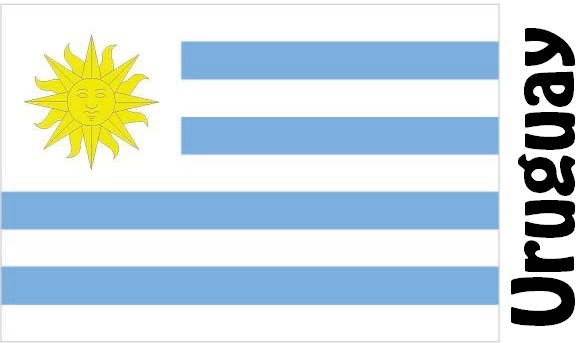
Uruguay is a republic in southeastern South America. The country is bounded by Argentina to the V, Brazil to the NE and the Atlantic to the S. The landscape consists of lowlands, hills and grasslands as well as low mountains in the NE to the border with Brazil. There are many lakes and three major river systems in the country. On the coast there are lagoons and swamps.
The climate is humid and temperate to tropical with hot summers and mild winters.
The cattle and sheep stock is of great economic importance, and both wool, fur, meat and dairy products are exported. Rice, flax, corn, citrus fruits and tobacco are grown. The country has no minerals of importance.
Uruguay was ruled by the military until 1985. Compared to the other countries in South America, Urugay is quite prosperous.
Country Facts – State Capital – Population Graph – Airports – Public Holidays – Embassies of Uruguay – Embassies in Uruguay – Import Regulations – Major Trade Partners – Major Imports – Major Exports
Uganda
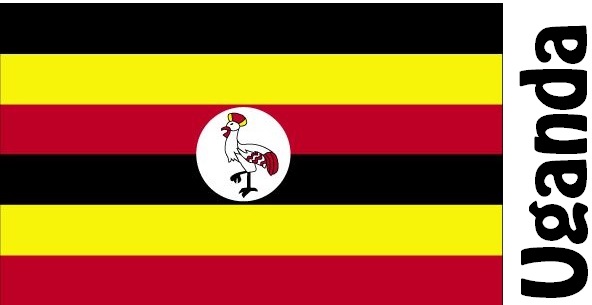
Uganda is a republic on Lake Victoria in East Africa. The country is an inland state with borders to South Sudan, Congo (Democratic), Rwanda, Tanzania and Kenya. The landscape consists of a high plateau with savannah surrounded by mountains, extinct volcanoes, rainforest, lakes and valleys.
The climate is tropical with two rainy seasons towards S and one rainy season towards N.
Agriculture is the biggest profession and the main selling crops are coffee, cotton and tea. Other crops are sugar, peanuts, corn, millet, cassava, sisal, sweet potatoes and vegetables. Some cattle, sheep, goats, poultry and pigs are kept.
Uganda was formerly a British colony. Became independent in 1962, but since then the country was ravaged by instability and civil war. Uganda is one of the poorest countries in the world.
Country Facts – State Capital – Population Graph – Airports – Public Holidays – Embassies of Uganda – Embassies in Uganda – Import Regulations – Major Trade Partners – Major Imports – Major Exports
United Arab Emirates
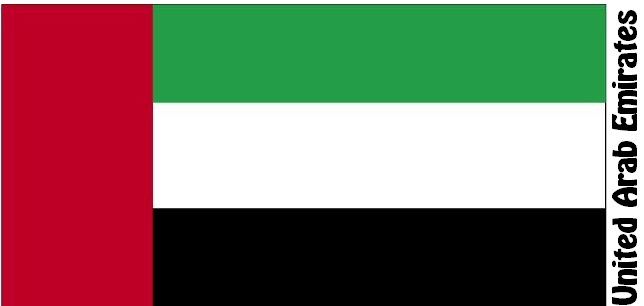
The United Arab Emirates is a federation of seven emirates. The country is located in SV Asia on the eastern part of the Arabian Peninsula between Saudi Arabia and Oman. The country has coastlines to the Gulf of Persia and the Gulf of Oman. The landscape consists of flat desert with oases, sand dunes, low scrub and mangrove forest on the coast and mountains in the island.
There is tropical desert climate and very hot.
The country’s oil reserves make up about 8% of the world’s known reserves and are absolutely crucial to the country’s economy. Natural gas and irrigated agriculture are also important.
In the past, the country was very poor, but today the United Arab Emirates is a prosperous country with a high standard of living and an extended welfare system. However, guest workers live under very poor living conditions.
Country Facts – State Capital – Population Graph – Airports – Public Holidays – Embassies of United Arab Emirates – Embassies in United Arab Emirates – Import Regulations – Major Trade Partners – Major Imports – Major Exports
Uzbekistan

Uzbekistan is a republic in Central Asia. The country has borders with Kazakhstan, Turkmenistan, Afghanistan, Tajikistan and Kyrgyzstan. The landscape consists of desert, steppes and rivers. There are highlands in NV and mountains towards the island. Lake Aral is in the northern part of the country.
There is temperate mainland climate with dry, hot summers and cool winters.
A large part of the population is employed in agriculture. The cattle and sheep stock is large, and cotton, rice, wheat, vegetables and fruit are grown, among other things. Irrigation is necessary in many places. The most important natural resources are natural gas, gold, oil, coal, copper, silver, uranium, lead and hydropower.
Uzbekistan was a republic in the Soviet Union until 1991.
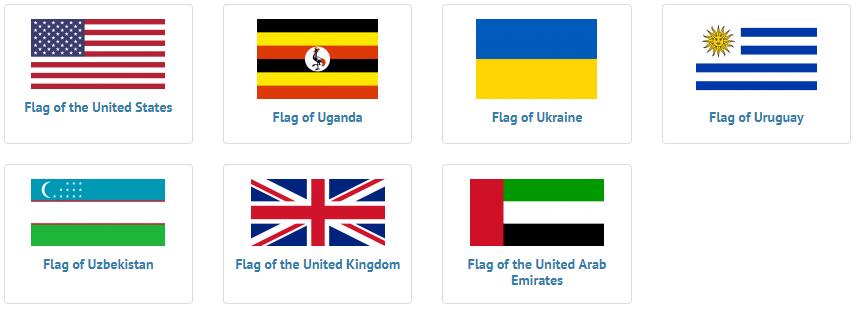
Country Facts – State Capital – Population Graph – Airports – Public Holidays – Embassies of Uzbekistan – Embassies in Uzbekistan – Import Regulations – Major Imports – Major Exports













































